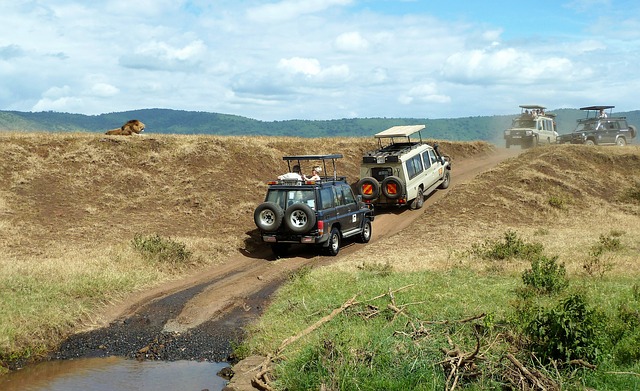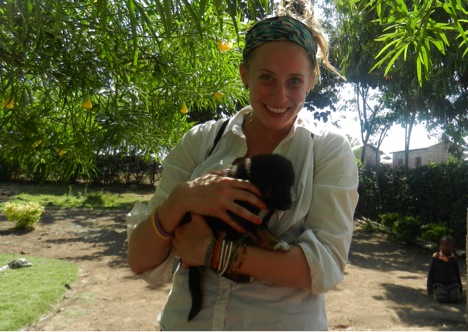Tired of Being Mzungu in Tanzania

I leave Tanzania in three days and it’s time to go. It’s been three months of cold showers, upset stomachs, and tough lessons, perhaps the toughest of which was this: I will forever be a tourist here. No matter how long I stay or how many local kids I love or how good my Swahili gets, I will never fit in. I can’t escape the label that my skin sticks bright and clear on my forehead. I am just a mzungu, only a white person.
That’s all there is to me. I am not a friend, not an enemy, sometimes not even a fellow human, but a representation, a generalization, water to oil. I am here to give things: my time, money, toys and clothes. These things are my identity.
A few times a week a volunteer like me, walking innocently along, not bothering anyone, is approached by kids or grown-ups (usually kids) who hold out a flat palm and demand in a hard voice, “Give me my money!” First of all, none of us carry large amounts of money with us because a) we don’t have much – we’re volunteers, remember? – and b) we might get mugged.
The habit of expecting money from mzungus is engrained in their culture. Somebody taught them this, and that somebody is not going to teach them otherwise.
Our standard response is to imitate them: we hold out our hands and say, “You give me my money!” But it never does any good. The habit of expecting money from mzungus is engrained in their culture. Somebody taught them this, and that somebody is not going to teach them otherwise.
As far as I can tell, the confusedness of race relations here for the most part stems from nothing more hostile than ignorance, passed down through the generations. There were maybe two or three Tanzanians on my flight from Amsterdam to Kilimanjaro; the rest of us were American or European tourists. Whereas in the west travel for leisure is a popular pastime, the majority of Tanzanians cannot afford such a hobby.
I don’t think they get out of their country much, and especially not off their continent.
Most of them don’t have televisions, cutting off access to documentaries and international news channels. They must eventually study history or geography in school, but I have no idea whether the national curriculum includes any study of Europe or Asia, for example, or North America.
No, I am not rich. I’m not poor like you, but I’m not rich like you think I am. One of the things I’m most looking forward to about going home is getting away from all the attention people pay us in the street here due one hundred percent to the color of our skin.
I know that my students didn’t even know Tanzania was part of Africa, so I’m not holding out much hope for the existence of vast world knowledge on their part. Due probably in part to this lack of understanding, everything is black and white to most Tanzanians I’ve encountered – literally black and white.
No, I am not rich. I’m not poor like you, but I’m not rich like you think I am. One of the things I’m most looking forward to about going home is getting away from all the attention people pay us in the street here due one hundred percent to the color of our skin. I often walk part of the trip to and from work with other volunteers.
Daladala conductors grab our wrists; taxi and bodaboda drivers shout after us offering rides; we hear hisses, catcalls, whistles, shouts.
Generally I choose not to respond, a habit acquired from months of receiving this treatment. If I’m in a good mood I’ll offer a simple, quiet greeting and/or a small smile in return.
Mostly people just holler “Mzungu!” or “Hey ‘zungu!” Generally I choose not to respond, a habit acquired from months of receiving this treatment. If I’m in a good mood I’ll offer a simple, quiet greeting and/or a small smile in return. Always dissatisfied, they keep yelling. They shout harshly at my back after I walk past: “Mzungu! Mzungu! Ay, mzungu! ‘Zungu! MA-ZUNG-U!”
These are not hostile greetings, but neither are they friendly; locals speak to me on the street in exactly the kind of tone you might use with a disobedient dog named Mzungu.
Our natural first reaction is to think, “Would you like it if you were walking down the street and I yelled ‘hey, black person!’ at you? Because it’s the same thing.” I want to inform these people that I do have an actual name, and it is not “mzungu.” That word’s definition encompasses, in my opinion, only a small portion of my identity – but to them, it’s all I have to offer. For this reason and for the manner in which it is often delivered, I’ve come to find it offensive.
I think that while it is not intended as such on every occasion, “mzungu” definitely crawls with shades of not-so-nice connotations, especially used, as one volunteer heard it, in the context of a hospital delivery room.
I think that while it is not intended as such on every occasion, “mzungu” definitely crawls with shades of not-so-nice connotations, especially used, as one volunteer heard it, in the context of a hospital delivery room. Women here give birth without much medication and if they scream or cry during labor, they’re mockingly called mzungus. That’s funny because it’s true, but not so flattering, hm?
Frankly, I have never in my life been on this end of racism and I hate it. But after I have time to cool down after particularly frustrating incidents, I consider that perhaps it’s good for me to feel this way, to be treated like this. I understand that people with so little might feel resentful of people with so much that they can afford to give it away, who can afford to work for free.
And so many people every day all over the world fall victim to abuse because of the color of their skin, but rarely does this happen to white people – we’re overdue for a little battering around, you might say. I’ve found that I don’t handle it as gracefully as I should.
I’ve found that I’m ready to go home and not hear that grating, segregating word ever again.

Tired of Being Mzungu in Tanzania
Related Reading
- Zanzibar Tourism: Describing My Home to the People of Zanzibar
- Girls Getaway to Zanzibar
- Volun-touring Versus Volunteering in Zanzibar
- The Truth About Zanzibari Men
- I Buried My Heart in Zanzibar
Have you traveled to Tanzania? What were your impressions? Email us at editor@pinkpangea.com for information about sharing your experience and advice with the Pink Pangea community. We can’t wait to hear from you.
Tired of Being Mzungu in Tanzania top photo credit: pixabay









I really relate to this. I think most of the commenters misunderstood you, we all know what the word means and where it comes from, but walking down the street and having packs of men SCREAAAMING at the top of their lungs MZUNGU MZUNGU HEEEY MUZUNGU MUZUGUUUUUU HEY COME HERE, and then when you don’t reply, they further scream at you asking what your problem is. In what part of the world would you respond to anyone screaming at you in the street??? In the few instances I have gone up to chat with those people, they don’t even look me in the eye, they stare up and down at my body and ask me for my phone number, not because they want to get to know my personality, they just want to bed me, for the sole reason that I’m a white girl.
It’s not the friendly “hello Mzungu” that bothers me(I love those interactions), it’s the tone in which it’s delivered. Or in situations where everyone else is addressed as ma’am, sister, or my friend, and you are just Mzungu, it leaves a sour taste in your mouth. Again it’s not everyone, everywhere, but I personally can’t walk outside without getting screamed at, so it’s frustrating when people deny our experiences.
Where I live muzungu deadass means white person (well mostly the way that it is used). I can see how this can be a bit annoying, but it could be worse.
Am a…Tanzania and yes I will admit it has been passed from generation that white people have lot of money but being called mzungu has nothing to do with being racist…and the way you talk about how youre student how insignificant tanzania is makes me think what a hypocrite volunteer you got your own issues soo please get over yourself …
This seems like such a small minded viewpoint.
I’m currently volunteering in Kenya and I also get called a Mzungu.. However I have never taken offence to it and my skin is is actually brown. I am black British. Mzungu has nothing to do with the colour of your skin. Open your mind a little and try to embrace new cultures, no wonder you felt like a tourist, you obviously took a us and them approach to your experience.
I recently returned from volunteering in Suswa, Kenya, and at times felt the same as Amanda about people calling me Mzungu. After a while I thought, “Only a few people shout it at me and people get called a lot worse because of their skin colour. Besides, the people doing it probably don’t see it the same as I do.” After that it seemed to stop being a problem for me and I’d either reply “Habari!” or wave hello.
The one thing that did really grate a bit was some Kenyans seeing me as a wallet on legs, but then although I’m not rich materially I have so much more than many of them, so its not surprising. I would say the people I got to know well, the ones that mattered most did not have that attitude. So I’m looking forward to going back soon.